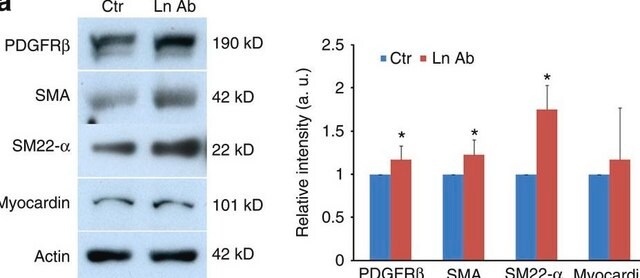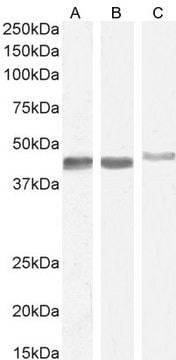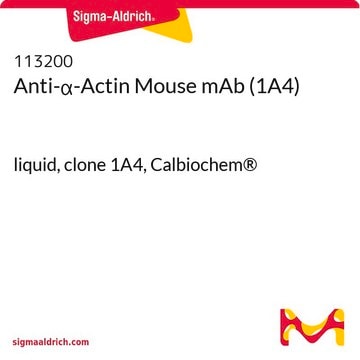Fontos dokumentumok
A2547
Monoclonal Anti-Actin, α-Smooth Muscle
clone 1A4, ascites fluid
Szinonimák:
Alpha Smooth Muscle Actin Antibody - Monoclonal Anti-Actin, α-Smooth Muscle, Alpha Smooth Muscle Actin Antibody Sigma, Anti-Alpha Smooth Muscle Actin Antibody, SMA
About This Item
IHC (f)
IHC (p)
WB
immunohistochemistry (frozen sections): suitable using smooth muscle cells
indirect immunofluorescence: 1:400 using blood vessels in sections of human appendix
western blot: suitable using smooth muscle cells
Javasolt termékek
biológiai forrás
mouse
Minőségi szint
konjugátum
unconjugated
antitest forma
ascites fluid
antitest terméktípus
primary antibodies
klón
1A4, monoclonal
molekulatömeg
antigen ~42 kDa
tartalmaz
15 mM sodium azide
faj reaktivitás
human, mouse, rat, chicken, frog, canine, rabbit, guinea pig, goat, bovine, sheep, snake
technika/technikák
immunohistochemistry (formalin-fixed, paraffin-embedded sections): suitable using smooth muscle cells
immunohistochemistry (frozen sections): suitable using smooth muscle cells
indirect immunofluorescence: 1:400 using blood vessels in sections of human appendix
western blot: suitable using smooth muscle cells
izotípus
IgG2a
UniProt elérési szám
alkalmazás(ok)
research pathology
kiszállítva
dry ice
tárolási hőmérséklet
−20°C
célzott transzláció utáni módosítás
unmodified
Géninformáció
human ... ACTA2(59)
mouse ... Acta2(11475)
rat ... Acta2(81633)
Looking for similar products? Látogasson el ide Útmutató a termékösszehasonlításhoz
Related Categories
Általános leírás
Mouse monoclonal anti-actin, α-smooth muscle antibody binds to actin from human, mouse, rat, bovine, chicken, frog, goat, guinea pig, rabbit, dog, sheep, and snake.
Monoclonal Anti-α Smooth Muscle Actin (mouse IgG2a isotype) is derived from the hybridoma produced by the fusion of mouse myeloma cells and splenocytes from an immunized mouse. The NH2 terminal synthetic decapeptide of α-smooth muscle actin coupled to keyhole limpet hemocyanin (KLH) was used as the immunogen. The isotype is determined using Sigma ImmunoTypeTM Kit (Sigma Stock No. ISO-1) and by a double diffusion immunoassay using Mouse Monoclonal Antibody Isotyping Reagents (Sigma Stock No. ISO-2).
Egyediség
Immunogén
Alkalmazás
Monoclonal Anti-Actin, α-Smooth Muscle antibody has been used in the detection of actin 2 in breast fibroblasts using immunofluorescence staining.
IHC analysis of x-gal stained muouse cardiac tissue was performed using the primary antibody, mouse monoclonal anti-smooth muscle actin to identify myofibroblasts.
Biokémiai/fiziológiai hatások
Mutations in actin 2 is associated with dysfunction of smooth muscles in arteries and is implicated in coronary heart disease. Mutations in ACTA2 contributes to tear and enlargement of aorta in thoracic aortic aneurysms (TAAD).
Fizikai forma
Tárolás és stabilitás
Egyéb megjegyzések
Jogi nyilatkozat
Nem találja a megfelelő terméket?
Próbálja ki a Termékválasztó eszköz. eszközt
kapcsolódó termék
Tárolási osztály kódja
10 - Combustible liquids
WGK
WGK 1
Lobbanási pont (F)
Not applicable
Lobbanási pont (C)
Not applicable
Válasszon a legfrissebb verziók közül:
Analitikai tanúsítványok (COA)
Nem találja a megfelelő verziót?
Ha egy adott verzióra van szüksége, a tétel- vagy cikkszám alapján rákereshet egy adott tanúsítványra.
Már rendelkezik ezzel a termékkel?
Az Ön által nemrégiben megvásárolt termékekre vonatkozó dokumentumokat a Dokumentumtárban találja.
Az ügyfelek ezeket is megtekintették
Tudóscsoportunk valamennyi kutatási területen rendelkezik tapasztalattal, beleértve az élettudományt, az anyagtudományt, a kémiai szintézist, a kromatográfiát, az analitikát és még sok más területet.
Lépjen kapcsolatba a szaktanácsadással















